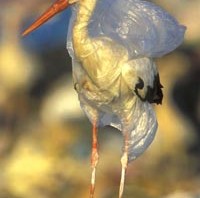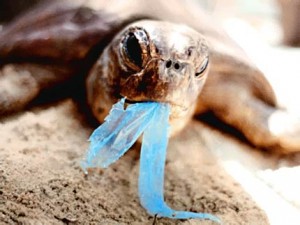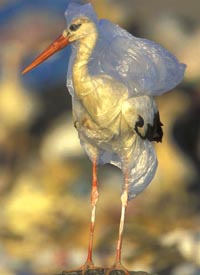
 Do you use plastic shopping bags from the supermarket? Do you reuse them or put them in your rubbish? Ever see them blowing around the streets, or floating in waterways? Spare a thought for the environment the next time you accept a plastic bag from a supermarket, or anywhere you shop. There are now very efficient alternatives to plastic bags when shopping. Please choose them.
Do you use plastic shopping bags from the supermarket? Do you reuse them or put them in your rubbish? Ever see them blowing around the streets, or floating in waterways? Spare a thought for the environment the next time you accept a plastic bag from a supermarket, or anywhere you shop. There are now very efficient alternatives to plastic bags when shopping. Please choose them.
Here are a few shocking facts about plastic bags in our oceans:
- 3.5 million tonnes of plastic bags are produced worldwide yearly. That’s approximately 1 trillion plastic bags coming into the world every year!
- Millions of tonnes of plastic are currently accumulating in the world’s oceans, causing massive ecological damage to water, marine life and other ecosystems.
- Plastic survives a long time in sea water – much longer than on land.
- If Columbus had dumped plastic bags into the ocean in 1492, fragments of his litter would still be drifting today!
- Plastic bags and plastic debris is like a sponge in seawater, and soaks up generous pollutants like polychlorinated biphenyls (PCBs) from ocean water.
- Seabirds eat pretty much everything floating on the water. They are now also eating and ingesting plastics in our seas, which is absorbed into their bodies. Evidence suggests this toxicity in seabirds is affecting their populations.
- There are 7 species of sea turtles in the world, which have evolved over hundreds of millions of years. A major food source for them is jellyfish, but numbers are declining from toxicity and death from eating plastic bags floating on the water surface that look like jellyfish.
- 6 of these 7 turtle species are now officially listed as at risk of extinction!
- In Australia, marine life like seabirds, turtles, fish and even dolphins and dugongs are being injured and killed from eating plastic bags and balloons.
- In countries where a tax was introduced for shoppers who choose plastic bags – such as in Ireland, where a 15 cent per bag tax is charged – the use of plastic bags has dropped 90%. Why aren’t we doing this in Australia?
- Other countries have banned plastic bags completely, including developing nation Bangladesh. If they can make such as a difference, with a poor economy and development, surely wealthier countries can achieve this easily.
 The 500 Year Shopping Trip
The 500 Year Shopping Trip
Almost every person in Australia uses an average of 300 plastic bags a year. That’s around 6 billion plastic bags all together. The early plastic shopping bags can take up to 500 years to decay in landfill. There is an alternative. It’s called a reusable shopping bag. And all major supermarkets now sell them for just a couple of dollars. Not only will using one help the planet, but your shopping is not likely to burst through the bag and roll around on the floor.
